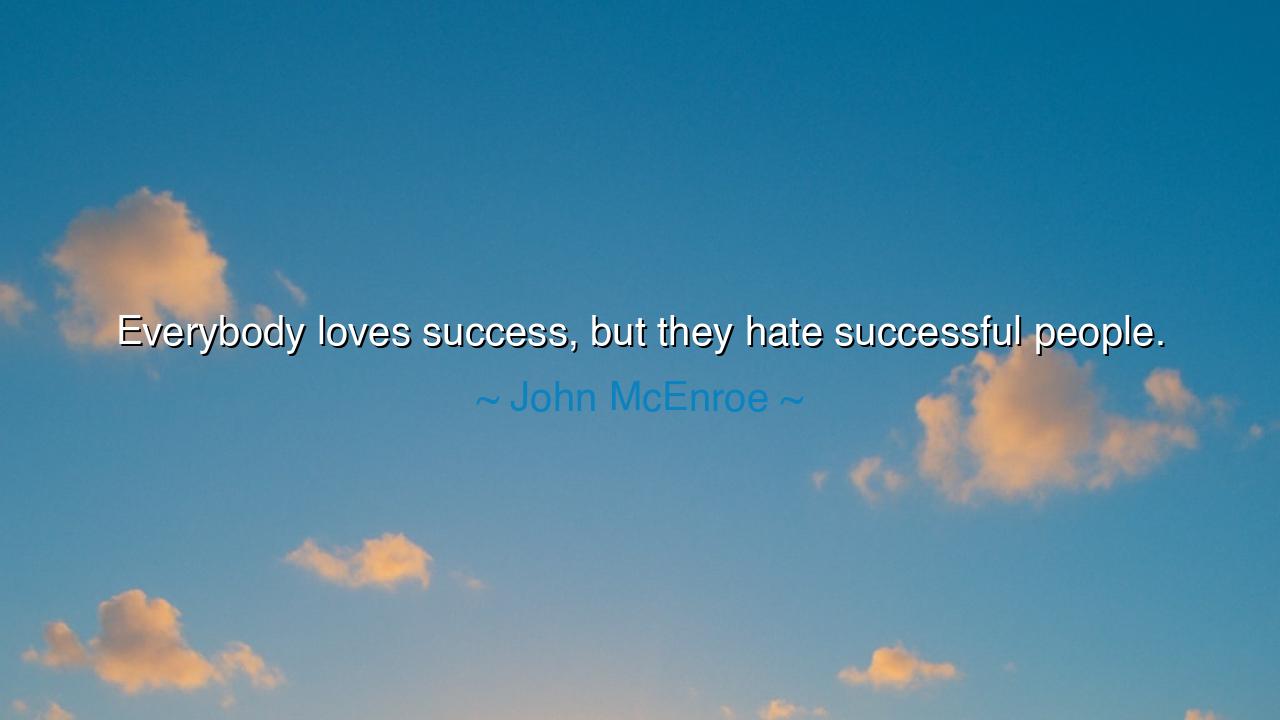
Everybody loves success, but they hate successful people.






Hear the raw and unflinching words of John McEnroe: “Everybody loves success, but they hate successful people.” In this saying lies a paradox as old as mankind itself. For the human heart rejoices in the idea of success, it admires victory, achievement, and triumph when viewed from afar. Yet when success wears a human face—when it belongs to a neighbor, a rival, or even a friend—it awakens envy, resentment, and the quiet hatred of those who feel left behind. The crown admired on the pedestal becomes despised when placed upon another’s head.
To love success in the abstract is easy, for it stirs our dreams and awakens hope. But to see another live what we have only imagined—this can wound the spirit, and in that wound jealousy breeds. The ancients warned of this very truth. Aristotle spoke of envy as one of the great destroyers of harmony, while the Hebrew scriptures declared that “envy is rottenness to the bones.” McEnroe, who lived beneath the glare of victory and the weight of public scrutiny, knew that success brings not only applause but also scorn.
Consider the tale of Julius Caesar. The Roman people loved the glory of conquest, the triumphs that filled their coffers, and the victories that lifted Rome to greatness. Yet they feared the man who delivered it all. His peers, consumed with envy, despised his success and turned upon him with daggers. Thus Caesar fell, not because he lacked triumphs, but because he had too many. His story is proof of McEnroe’s wisdom: success itself is adored, but the successful are often despised.
The same can be seen in the world of invention. Thomas Edison brought forth light to banish the darkness of night. The world embraced the lamp, yet many despised the man—calling him ruthless, arrogant, unworthy of the genius he claimed. The irony is eternal: people love the fruits of success, but scorn the tree that bore them. This is the burden of those who achieve: they bring gifts to the world, yet often receive envy instead of gratitude.
McEnroe himself was a gladiator of the court, his fire and brilliance celebrated in headlines. Yet the very spirit that made him great—his passion, his defiance, his refusal to bow—drew scorn as well as admiration. Crowds loved the thrill of his victories, but many despised him for embodying the raw edges of greatness. Here again we see the truth: the same fire that warms some burns others. To stand in the light of success is also to cast shadows that provoke hatred.
The lesson, then, is clear and eternal: do not seek success for the sake of applause, for applause is fickle and envy is relentless. Seek it for the sake of becoming what you were meant to be, for the sake of the work itself, for the joy of mastering your craft. If you rise, some will cheer and some will curse, but neither defines you. What defines you is the courage to pursue your gift without fear of the hatred it may awaken.
Practical action is before you: celebrate the success of others instead of resenting it. Train your heart to see their victory as proof that greatness is possible, not as a theft of your own dreams. And when your time of triumph comes, accept both the admiration and the envy with humility, knowing they are twin shadows of the same flame. Let neither puff you with pride nor weigh you with despair.
And so, remember the words of McEnroe: everybody loves success, but they hate successful people. Do not be deceived by the love of the crowd, nor crushed by their envy. Walk your path with steadfast heart, offering your gift to the world. For though some may hate the bearer, the gift itself will endure, and in that endurance lies true immortality.






AAdministratorAdministrator
Welcome, honored guests. Please leave a comment, we will respond soon